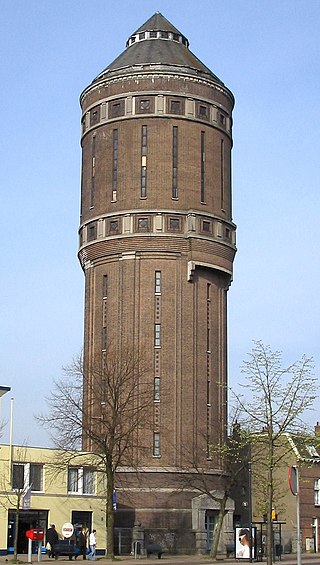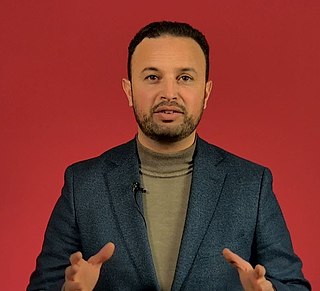
Schagen is a city and municipality in the northwestern Netherlands. It is located between Alkmaar and Den Helder, in the region of West Friesland and the province of North Holland. It received city rights in 1415. In 2013, Schagen merged with the neighbouring municipalities of Zijpe and Harenkarspel, forming a new municipality, also called Schagen. The town hall is located in the main town of Schagen.

Hermenegildus Felix Victor Maria "Herman" Finkers is a Dutch comedian, who is well known in the Netherlands for his friendly, dry-witted humour and his ambiguous style of storytelling. His humour is never at the expense of others, except his brother Wilfried Finkers, who is frequently the target of jokes. Wilfried Finkers co-wrote material and occasionally appeared in his brother's shows.
The Peeters directive, officially Circular BA 97/22 of 16 December 1997 concerning the use of languages in municipal councils of the Dutch language area, is a circulaire of the Flemish government regulating the use of languages in municipal councils in the Flemish Region (Belgium), where the sole official language is Dutch. The directive is more in particular aimed at the municipalities with language facilities bordering the Brussels Capital-Region. It stipulates that each and every time French-speakers deal with the government, they must explicitly ask for their documents to be in French.

Simon Berman was the mayor of Kwadijk, Middelie, Warder, Schagen, Bedum, and Alblasserdam in the Netherlands. He was the first mayor of Kwadijk, Middelie, and Warder to actually live in one of those villages. As a popular mayor of Schagen, he handled a double murder case that drew national media attention and advanced a professional school and regional light rail and canals. In Alblasserdam, he addressed the local impacts of World War I. Berman is also known for his association with Christian anarchism.

BIJ1, formerly known as Article 1, is a political party in the Netherlands. It was founded in Amsterdam in 2016 by Sylvana Simons, a television personality who was formerly connected to another party, Denk. Edson Olf has led the party since September 2023.
2018–19 Eerste Klasse was a Dutch Eerste Klasse association football season of the Eerste Klasse.

We Are Here is a collective of migrants based in Amsterdam, the Netherlands, which campaigns for human rights for its members and all undocumented migrants. The asylum seekers have in many cases had their applications to remain in the Netherlands denied but they either cannot go back or refuse to return to their country of origin. They demand access to social services such as medical care and housing. The group formed in 2012 and by 2015 contained over 200 migrants from around 15 countries.
Ecotribe Teuge is a collective of people living on a squatted terrain in the Dutch countryside. It is located on the edge of the village of Teuge, in the province of Gelderland. The buildings were constructed by the Nazis and formerly used to house Moluccan soldiers. The site was occupied in 2001, when people began to live there in an off-the-grid and self-sufficient manner. Since 2018, there are plans by the province to develop the terrain.

The Tabakspanden are a group of buildings standing on the Spuistraat in central Amsterdam, adjacent to the Keizerrijk and Wijdesteeg alleyways. Named after a former owner, the speculator Hendrik Tabak, they were mostly squatted from 1983 onwards, although the artist Peter Klashorst also rented an apartment and gallery space. The best known building was Spuistraat 199, known as the Slangenpand (Snakehouse) because of the large mural which covered the front exterior. In 2015, the squatters were evicted and the buildings were mostly demolished prior to redevelopment. The new project is known as De Keizer and has 69 apartments, a restaurant and a gallery. Two of the buildings are registered as rijksmonumenten.

De Vloek was a squatted, self-managed social centre in The Hague, the Netherlands, between 2002 and 2015. Located on Hellingweg 127 in Scheveningen, beside the North Sea, the squat hosted workplaces, living spaces, a venue, and a vegan restaurant. The local council tolerated the occupation until 2014, when it decided to sell the building. A political struggle over the eviction began; some political parties supported the squatters and the Scheveningen Pier was briefly occupied as a protest action. A deal was made for the squatters to move to a former school building and the Vloek was eventually evicted in September 2015.

The Ubica buildings are two adjacent buildings standing at 24 and 26 Ganzenmarkt, in central Utrecht, the Netherlands. Number 24 is a rijksmonument. The first recorded mention of the buildings is from 1319. After centuries of residential use, the buildings were bought by the Ubica mattress company in 1913 and used until a devastating fire in 1989. The buildings were then squatted for 21 years, before being redeveloped into a hotel and café-restaurant in 2014.

The Amsterdamsestraatweg Water Tower is located in Utrecht, the Netherlands. The water tower was built at Amsterdamsestraatweg 380 in 1916, in the style of the Amsterdam School. It became derelict in 1986 and was repeatedly squatted before its redevelopment into apartments began in 2020.
Melissa Kremer was a Dutch author, who died from acute leukemia. Her book, Mijn kwaadbloed, became a Dutch bestseller. Its presales were unparalleled in popularity.

Derk Geertsz Boswijk is a Dutch politician serving as a member of the House of Representatives since the 2021 general election. A member of the Christian Democratic Appeal (CDA), he previously held a seat in the States of Utrecht from 2015 to 2021 and chaired his party's caucus during the last two of those years.

Stephan Ruben Tobias van Baarle is a Dutch politician. A member of the minority interest party DENK, he served on the Rotterdam municipal council from 2018 to 2022. He was elected to the House of Representatives in 2021 and succeeded Farid Azarkan as DENK's parliamentary leader two years later.

Faissal Boulakjar is a Moroccan-born Dutch politician, who has been serving as a member of the House of Representatives since the 2021 Dutch general election. He is a member of the social liberal party Democrats 66 (D66) and previously held a seat in the Breda municipal council (2014–2021).

Daniël "Daan" de Neef is a Dutch speechwriter and former politician. A member of the conservative liberal People's Party for Freedom and Democracy (VVD), De Neef was a political staffer of the VVD and owned a speech consultancy. He held a seat in the Breda municipal council starting in 2018 and was elected to the House of Representatives in the 2021 general election. De Neef stepped down the following year and switched to the Party for the Animals (PvdD) shortly after.

Harmen M. Krul is a Dutch politician of the Christian Democratic Appeal (CDA) and a former Royal Netherlands Navy officer. Krul was mostly raised in Den Helder and joined the Royal Naval College in 2013 after graduating high school. He served as a naval officer, rising to the rank of lieutenant before becoming secretary on the boards of two professional associations for officers in 2020.

Party for Sports is a political party in the Netherlands. It has a focus on sports, health, and a healthy lifestyle.















